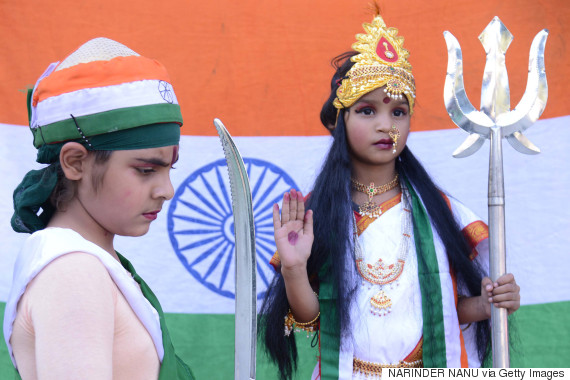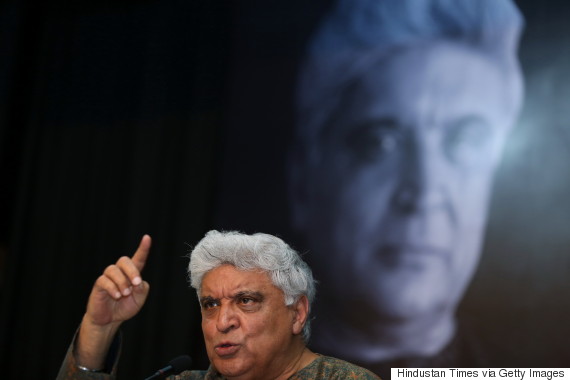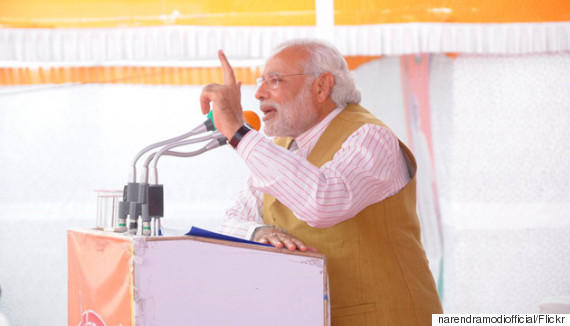It just occurred to me that I have never chanted 'Bharat Mata Ki Jai' even once in my thirty years of existence. Not as a 7-year-old sulking in the school grounds over a hoisted flag not picking up wind like they do in the movies. Not as a 10-year-old in a crummy room full of noisy uncles, aunts, brothers, grandparents screaming, sighing and muttering through a India-Pakistan cricket match. Not as an embarrassing 12-year-old in a single-screen theatre, tearing up as a bullet-ridden Akshay Khanna died in JP Dutta's Border. Not after gingerly stopping work and standing up following a junior colleague as the national anthem played on television in an empty newsroom on Independence Day. 'Bharat Mata Ki Jai' was never a part of the language of my patriotism or the cultural experiences that partially shaped it. For me, it was something that belonged to the movies, and like several other things, was better off being just there.
Did I vehemently reject the implications of 'Bharat Mata Ki Jai'? For a better half of my life, not consciously. Later on, the idea of deifying the country as a mythical mother figure when a majority of its women inhabitants continue to be dispossessed and violated didn't appeal to me. But I never actively grudged anyone who found solace, inspiration or just that satisfying feeling of having done his or her bit for the country by chanting those few words. But that was till 'Bharat Mata Ki Jai' was turned into a litmus test for patriotism.
![children dressed as bharat mata]()
A child dressed as Bharat Mata.
If today, someone like that BJP MP in the Maharashtra assembly who dared AIMIM MLA Warris Pathan, came and demanded that I chant 'Bharat Mata Ki Jai' to test my patriotism, I would most definitely decline to do it. That's not because I am averse to appreciating my country, but because I have forged my own idiom of doing it from my own experiences of having lived in this country. And I don't take too well to someone breathing down my neck and insisting that it's no patriotism unless it sounds like his or hers. Also, it is an act of aggression that anchors itself in the power in numbers.
When nationalism gets politicized, the thin line between patriotism and jingoism blurs. And post the JNU row, it has been happening with alarming frequency. When Javed Akhtar claims that chanting 'Bharat Mata Ki Jai' is his 'right', he should perhaps realise that it is completely within someone else's 'right' to not chant the same in the name of patriotism. Or that not chanting the same doesn't warrant condemnation.
As contributing editor Shivam Vij pointed out, Javed Akhtar, a vocal atheist, fails to see the problem with demanding worship of "Bharat Mata". Akhtar's claims finds echo in a majority of people who see no problem in imposing 'Bharat Mata Ki Jai' as the new passport for patriotism. However, it is necessary to point out the obvious here. 'Bharat' is a religion-less entity, 'Bharat Mata' has Hindu undertones due to its history and origin.
![javed akhtar]()
As Ajaz Ashraf wrote in Scroll.in, the slogan 'Bharat Mata Ki Jai' comes from a history and context that gives it strong Hindutva undertones. This does not mean every Muslim is opposed to raising the slogan. At the World Sufi Forum in Delhi earlier this week and elsewhere, many have said that they are perfectly happy to raise the slogan.
The problem is in turning the slogan into a litmus test of patriotism. A Muslim, or anyone for that matter, might refuse to raise the slogan principally because their patriotism is being questioned and being held against an arbitrary standard about which there is no common agreement. Or because, as some Muslims do, they worry that shouting the slogan might be against their religious tenets that prohibit idol worship. Whatever be the reasons, a refusal to shout Bharat Mata Ki Jai does not mean that person is a lesser patriot.
After being suspended from the Maharashtra Assembly for not chanting 'Bharat Mata Ki Jai', Pathan, said, ""I am proud of having been born in this country and god willing will be buried in the very earth here. I have not disrespected my country. And I cannot think of doing so. Jai Hind. Jai Bharat. Jai Maharashtra."
![narendra modi]()
Prime Minister Modi likes to begin and end his speeches chanting 'Bharat Mata Ki Jai'.
It's not difficult to see why Pathan has a problem with 'Bharat Mata Ki Jai' but not with 'Jai Hind'. The latter refers to the country, which was named after its Hindu majority, but not Hinduism itself. The former is rooted in Hindu culture. The latter exudes a quiet pride in the country, the former has an undeniable hint of belligerence, perhaps why it never figured even in my conservative, Hindu upbringing either. We quietly folded our hands, my mother and grandmother whispering barely audible prayers, as a truck mounted with Durga idols rolled away from the Puja pandal for immersion. We were never the ones on the truck waving wildly and roaring 'bolo Dugga mai ki jai', but we never quite resented them either. We would have, had we been told that the latter was the only right way to be religious.
Writer and journalist Raghu Karnad pointed out on Twitter that we seem to have mixed up nationalism with bullying. The 'my patriotism is better than yours' narrative has existed for a while now, lending itself to tea break squabbles, op-ed wars and more recently, Twitter quarrels. The phrase possibly edged past other such nationalistic slogans in public consciousness after earning the stamp of approval from Narendra Modi, who likes to end and begin his speeches with 'Bharat Mata Ki Jai'.
However, it has now been firmly steered into the bullying territory with penalties like suspension from the assembly, as if the test of patriotism is whatever catches BJP's fancy. It's ironic and revolting in equal parts. Because the country, whose honour these bellicose men claim to be defending, also happens to possess a constitution, a far more legitimate, convincing representation of its ideals than the notion of 'Bharat Mata'. And the hyper patriots are busy pretending like it doesn't exist.
![]() Like Us On Facebook |
Like Us On Facebook |
![]() Follow Us On Twitter |
Follow Us On Twitter |
![]() Contact HuffPost India
Contact HuffPost India
Also see on HuffPost:
Did I vehemently reject the implications of 'Bharat Mata Ki Jai'? For a better half of my life, not consciously. Later on, the idea of deifying the country as a mythical mother figure when a majority of its women inhabitants continue to be dispossessed and violated didn't appeal to me. But I never actively grudged anyone who found solace, inspiration or just that satisfying feeling of having done his or her bit for the country by chanting those few words. But that was till 'Bharat Mata Ki Jai' was turned into a litmus test for patriotism.

A child dressed as Bharat Mata.
If today, someone like that BJP MP in the Maharashtra assembly who dared AIMIM MLA Warris Pathan, came and demanded that I chant 'Bharat Mata Ki Jai' to test my patriotism, I would most definitely decline to do it. That's not because I am averse to appreciating my country, but because I have forged my own idiom of doing it from my own experiences of having lived in this country. And I don't take too well to someone breathing down my neck and insisting that it's no patriotism unless it sounds like his or hers. Also, it is an act of aggression that anchors itself in the power in numbers.
When nationalism gets politicized, the thin line between patriotism and jingoism blurs. And post the JNU row, it has been happening with alarming frequency. When Javed Akhtar claims that chanting 'Bharat Mata Ki Jai' is his 'right', he should perhaps realise that it is completely within someone else's 'right' to not chant the same in the name of patriotism. Or that not chanting the same doesn't warrant condemnation.
As contributing editor Shivam Vij pointed out, Javed Akhtar, a vocal atheist, fails to see the problem with demanding worship of "Bharat Mata". Akhtar's claims finds echo in a majority of people who see no problem in imposing 'Bharat Mata Ki Jai' as the new passport for patriotism. However, it is necessary to point out the obvious here. 'Bharat' is a religion-less entity, 'Bharat Mata' has Hindu undertones due to its history and origin.

As Ajaz Ashraf wrote in Scroll.in, the slogan 'Bharat Mata Ki Jai' comes from a history and context that gives it strong Hindutva undertones. This does not mean every Muslim is opposed to raising the slogan. At the World Sufi Forum in Delhi earlier this week and elsewhere, many have said that they are perfectly happy to raise the slogan.
The problem is in turning the slogan into a litmus test of patriotism. A Muslim, or anyone for that matter, might refuse to raise the slogan principally because their patriotism is being questioned and being held against an arbitrary standard about which there is no common agreement. Or because, as some Muslims do, they worry that shouting the slogan might be against their religious tenets that prohibit idol worship. Whatever be the reasons, a refusal to shout Bharat Mata Ki Jai does not mean that person is a lesser patriot.
After being suspended from the Maharashtra Assembly for not chanting 'Bharat Mata Ki Jai', Pathan, said, ""I am proud of having been born in this country and god willing will be buried in the very earth here. I have not disrespected my country. And I cannot think of doing so. Jai Hind. Jai Bharat. Jai Maharashtra."

Prime Minister Modi likes to begin and end his speeches chanting 'Bharat Mata Ki Jai'.
It's not difficult to see why Pathan has a problem with 'Bharat Mata Ki Jai' but not with 'Jai Hind'. The latter refers to the country, which was named after its Hindu majority, but not Hinduism itself. The former is rooted in Hindu culture. The latter exudes a quiet pride in the country, the former has an undeniable hint of belligerence, perhaps why it never figured even in my conservative, Hindu upbringing either. We quietly folded our hands, my mother and grandmother whispering barely audible prayers, as a truck mounted with Durga idols rolled away from the Puja pandal for immersion. We were never the ones on the truck waving wildly and roaring 'bolo Dugga mai ki jai', but we never quite resented them either. We would have, had we been told that the latter was the only right way to be religious.
Writer and journalist Raghu Karnad pointed out on Twitter that we seem to have mixed up nationalism with bullying. The 'my patriotism is better than yours' narrative has existed for a while now, lending itself to tea break squabbles, op-ed wars and more recently, Twitter quarrels. The phrase possibly edged past other such nationalistic slogans in public consciousness after earning the stamp of approval from Narendra Modi, who likes to end and begin his speeches with 'Bharat Mata Ki Jai'.
However, it has now been firmly steered into the bullying territory with penalties like suspension from the assembly, as if the test of patriotism is whatever catches BJP's fancy. It's ironic and revolting in equal parts. Because the country, whose honour these bellicose men claim to be defending, also happens to possess a constitution, a far more legitimate, convincing representation of its ideals than the notion of 'Bharat Mata'. And the hyper patriots are busy pretending like it doesn't exist.
 Like Us On Facebook |
Like Us On Facebook |  Follow Us On Twitter |
Follow Us On Twitter | Also see on HuffPost: